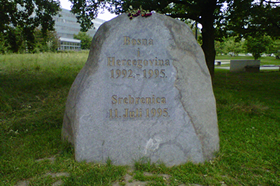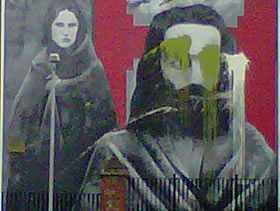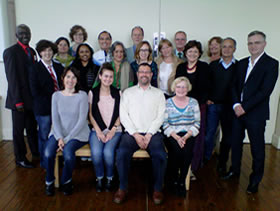History and memorialisation: narratives about the past examined through the lens of cultural rights
Special Rapporteur in the field of cultural rights
How are historical narratives relevant to human rights?

Geneva, Place des Nations, Memorial for Srebrenica ©
Historical narratives are important elements of cultural heritage. They play a decisive role in collective identity, with people striving to retrieve, validate, make known and have acknowledged by others their own history, on the one hand, and contesting interpretations, on the other. This has been evident in all country visits undertaken by the Special Rapporteur.
How we learn and what we know about our past can either strengthen peace and respect for the human rights of all, or maintain division and tensions among different groups of society.
Below, you will find the thematic work relating to historical narratives conducted by the mandate in the field of cultural rights over the years, as well as developments in other parts of the UN system and important links.
Reports
The writing and teaching of history (2013)
In her 2013 report to the General Assembly, the Special Rapporteur considers the issue of the writing and teaching of history, with a particular focus on history textbooks. In her study, the Special Rapporteur seeks to identify the circumstances under which the official historical narrative promoted by the State in schools becomes problematic from the perspective of human rights and peace. She also proposes a set of recommendations to ensure a multi-perspective approach in teaching history.
Read more on the report page
Memorialization processes in post-conflict and divided societies (2014)

Mural, Derry / Londonderry, Northern Ireland ©
Building on the previous study, the Special Rapporteur decided to address memorialization processes of the events of the past in post-conflict and divided societies, with a specific focus on memorials and museums of history/memory. She presented this report to the Human Rights Council in 2014
In her report, the Special Rapporteur stresses that entire cultural and symbolic landscapes are designed through memorials and museums, which both reflect and shape, negatively or positively, social interactions and people's cognition of identities – their own as well as that of others. Accordingly, actions in the cultural field are critical for achieving the overall societal goals of transitional justice and sustainable peace.
She makes a number of recommendations grounded in the principle that memorialization should be understood as a process that provides the spaces necessary to those affected by human rights violations to articulate their narratives. Memorial practices should stimulate and promote civic engagement, critical thinking and discussion regarding the representation of the past, but equally the contemporary challenges of exclusion and violence.
Read more on the page dedicated to the report on memorialization processes.
To inform both her reports and elucidate ways and means to sensitize institutions and society on diverse cultural heritage and to enhance cooperation for its safeguard and promotion, the Special Rapporteur held an open consultation on 5 July 2013 in Geneva. Member States, specialized agencies, intergovernmental organizations, national human rights institutions and non-governmental organizations were invited to take part. See the note verbal and read below the statements from the experts invited:
- Special Rapporteur in the field of cultural rights, Farida Shaheed
- Ms. Dubravka Stojanovic, Professor at the History department, Faculty of Philosophy, Belgrade university
- Mr. Pierre Hazan, Co-Director of the PIMPA research project ("Politics of Memory and Art Practices: The Role of Art in Peace and Reconstruction Processes"), Geneva University of Art and Design.
- International Bureau of Education
- Conseil national des droits de l'homme, Morocco
- Bahá'í International Community
Related events and documents
- High-level policy dialogue "Guarantee of non-recurrence: from aspiration to policy", organized by Pablo de Grieff, Special Rapporteur on the promotion of truth, justice, reparation and guarantees of non-recurrence, in cooperation with the Swedish Ministry of Foreign Affairs, Stockholm, 13-14 October 2015
- Agenda of the 2 days meeting
- Resulting reports of the Special Rapporteur on the promotion of truth, justice, reparation and guarantees of non-recurrence to the Human Rights Council, A/HRC/30/42 and to the General Assembly, A/70/438
- Workshops on the writing and teaching of history, organised by UNESCO Etxea, University of the Basque Country, Bilbao, 17 March 2015
- Concluding remarks of the Special Rapporteur to the conference on the role and potential of transitional justice mechanism for social transformation and reconciliation in countries in transition throughout the MENA region, "Integrating Economic, Social, and Cultural Rights in Transitional Justice Processes: A Vehicle for Reform in the Middle East and North Africa?", organized by OHCHR and the Center for International Peace Operations (ZIF) with other partners, Tunis, Tunisia, 24-26 September 2014
- Feature story: Out of many perspectives comes one history, 23 September 2014
- Feature story: Integrating cultural rights in transitional justice strategies in post-conflict societies, 25 March 2014
- Feature story: Post-conflict societies: learning history from different points of view, 28 October 2013
- "Whose history?" Side event, New York, 25 October 2013
- Seminar organized by the Special Rapporteur, in cooperation with the Research team PIMPA (Memory Politics and Art Practices), CCC Research-Based MA Programme of Haute école d'art et de design, Geneva (HEAD), 7-8 October 2013
- Public debate with the Special Rapporteur and artist Milica Tomic "Art and memory after war", Geneva, 7 October 2013

Participants of Consultation in Northern Ireland, 1,
2 and 3 July 2013 ©
- Consultation on cultural rights in divided and post-conflict societies, organized by the Northern Ireland Human Rights Commission (NIHRC) in association with the University of Ulster and in cooperation with the Special Rapporteur in the field of cultural rights, Derry / Londonderry, Northern Ireland, 1-3 July 2013
- Video about the consultation
- Keynote speech by the Special Rapporteur
- Report of the Northern Ireland Commission on Human Rights to the Human Rights Council on the consultation, A/HRC/25/NI/5.
Further developments in the UN system
- The Special Rapporteur on the promotion of truth, justice, reparation and guarantees of non-recurrence, Pablo de Greiff, publishes a report on the three spheres of interventions of public policies to foster non-recurrence, which highlights the role of education, arts and culture (A/HRC/30/42), 7 September 2015
- Debate at the Human Rights Council on the state of racial discrimination worldwide, for the commemoration of the International Day for the Elimination of Racial Discrimination, on the theme of “Learning from historical tragedies to combat racial discrimination today”, Geneva, 20 March 2015
- Human Rights Council adopts resolution 43/29, which highlights the importance of preserving historic memory, without distortion, relating to gross human rights violations and abuses and to ensure the full enjoyment of cultural rights in the context of genocide prevention.
- Human Rights Council panel on history and memory (2014). In resolution 25/19, adopted on 28 March 2014, the Human Rights Council decided to hold on 9 September 2014, during its twenty-seventh session, a panel discussion on history teaching and memorialization processes, with a view to, inter alia, contributing to the sharing of good practices in this area.
- Read the concept note of the panel discussion here
- Summary report of panel discussion on history teaching and memorialization processes (A/HRC/28/36)
- Thematic debate at the Security Council, "War, its lessons, and the search for a permanent peace", 29 January 2014
- OHCHR Publication on "Transitional Justice and Economic, Social and Cultural Rights", 2014, in English (also available in all UN languages on this page)
Useful links
- CARTE - Centre Africain de recherches sur les traites et les esclavages
- CRDSEE - Center for Democracy and reconciliation in South East Europe
- EUROCLIO - European Association of History Educators
- GEI - Georg Eckert Institute for International Textbook Research
- IMPACT-SE: Institute for Monitoring Peace and Cultural Tolerance in School Education
- Impunity Watch - memorialization
- International Coalition of Sites of Conscience
- Northeast Asian History Foundation
- Special Rapporteur on the promotion of truth, justice, reparation and guarantees of non-recurrence
- PIMPA / PPR: Politics of Memory and Art Practices: The Role of Art in Peace and Reconstruction Processes
- PRIME - Peace Research Institute in the Middle East
- Council of Europe History Teaching Website
- UNESCO General and Regional histories